
6 Oct, 2014
First halal tourism conf in Spain awakens Europe to US$181 billion Islamic market
Granada, Spain – Spanish tourism authorities could double the number of visitor arrivals if they better market the country’s rich Islamic heritage, a unique competitive advantage over the rest of Europe. Indeed, speakers at the first Halal Tourism Conference (HTC) organised in Europe between 22-23 Sept 2014 sent clear messages that countries, companies and communities across Europe can do more to tap the huge potential of Muslim travellers, especially from Asia, and have far more to gain by welcoming them as tourists rather than shunning them as potential terrorists.
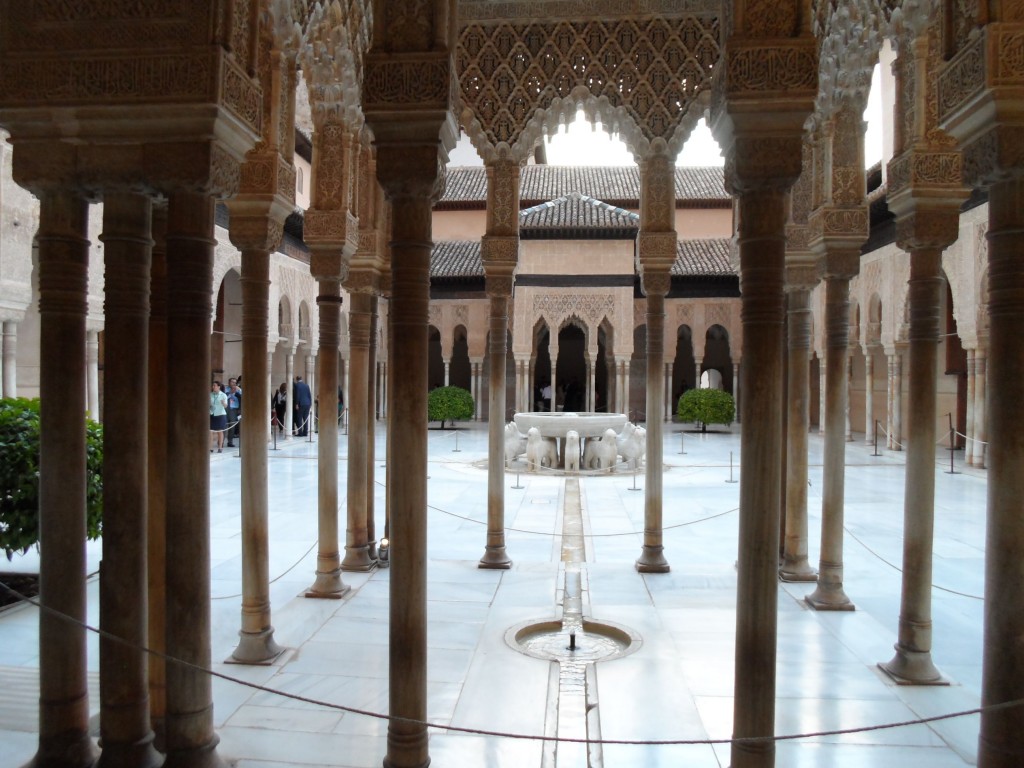 The magnificent Alhambra |
About 200 delegates from an estimated 15 countries convened for the HTC, organised by UK-based Creative Minds Media, along with partner tour operator Andalucian Routes. It attracted speakers from a broad swathe of companies and countries, such as Italy, Malaysia, Indonesia, Croatia, Kuoni, Shaza Hotels, and more. Southern Spain was considered a natural choice; it boasts an unparalleled set of monuments, museums and mosques testifying to its Islamic heritage, especially the magnificent Alhambra Palace in Granada. Conference delegates, given a private evening tour of the Palace, were amazed at its architectural elegance and superb landscaping.
The business potential of the Islamic tourism market is enormous. The global population of Muslims is estimated at between 1.5 billion to 1.7 billion, of whom about 35 million are in Europe. Spain itself has a population of 1.8 million. Add to that Turkey with 74 million Muslims, Indonesia, the world’s largest Muslim-majority country with 250 million, plus Bangladesh, Pakistan and the substantial number of Muslim minorities in Russia, India and China. A further breakdown of the demographics indicates a huge volume of young people and emerging middle class.
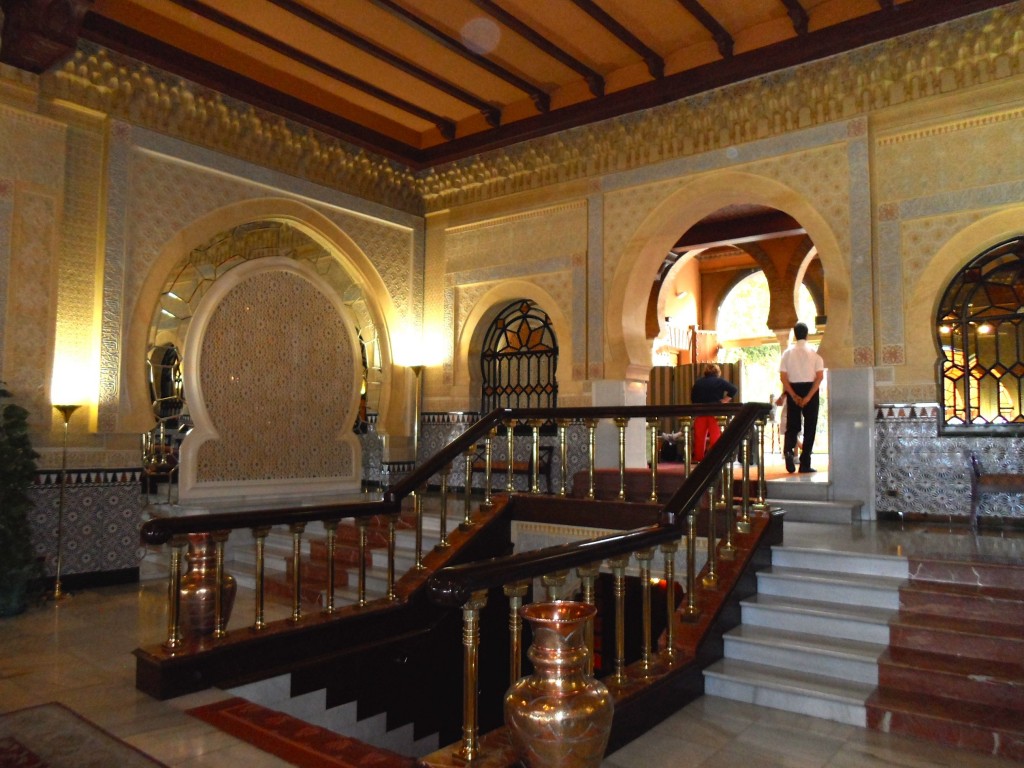 The impressive Islamic-heritage style foyer area of the Alhambra Palace hotel |
Mr. Rafi-uddin Shikoh, Managing Director & CEO of Dinar Standard, a New York-based research and advisory firm specialising in the Islamic world, said Muslims globally spent US$137 billion on tourism in 2012, expected to climb to US$181 billion in 2018. That is well ahead of the U.S. and German travellers combined. “This is not just another niche market,” he said. Four of the fastest growing airports are in Muslim countries: Istanbul, Dubai, Kuala Lumpur, Jakarta. CrescentRating, a Singapore-based company headed by Muslim entrepreneur Fazal Bahardeen, has started product rankings and certification schemes to help Muslim consumers identify appropriate products and destinations. Websites such as halalbooking.com are providing booking and reservation services. Even tour operator Kuoni has joined the bandwagon.
In his welcoming remarks, Mr. Manuel Munoz Gutierrez, Director of Granada Tourist Board and Granada Convention, said the region’s Islamic heritage was one of four products that could be commercialized for tourism in southern Spain, the others being culture, rural tourism and skiing. However, he said the Alhambra is the main attraction, with more than 2.3 million visitors per year. Referring to it as one of the most visited monuments of Europe, he said it contributed to reducing seasonality fluctuations as visitors came year-round, although the peak is at the start of summer. One very popular annual event is the International Festival of Music and Dance held at the Alhambra in July for three weeks, featuring 80-90 performances from all over the world.
However, two key issues have to be overcome.
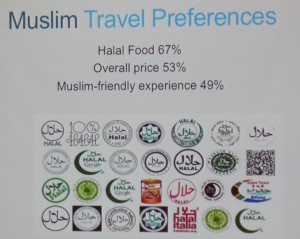 |
Although many Muslim travellers are notorious for their nocturnal proclivities and fondness for alcohol, millions of others are sticklers for the rules. They seek out halal food (similar to kosher food in the Jewish tradition) and prefer facilities such as toilet water-nozzles, prayer mats, directions to Makkah (Mecca), and several more. For those keen to attract this lucrative market, the dilemma is how to do so without driving away the non-Muslim market. Others are wary about the negative image associated with “Islam” or “sharia”.
Moreover, as with most issues in the Islamic world, disagreements are rife about the certification process: If a product is to be declared “halal-certified,” who exactly is to provide the certification? Mr. Nermin Merdzanovich, Chairman, Islamic Community in Croatia, Center for Halal Quality Certification, said, “We need to establish one global halal standard for certification as well as for accreditation. This is currently the most pressing issue with the halal industry. You find too many different standards between countries and also within the same country. There are more than 200 institutions in 48 countries accredited to issue halal certifications.” He said the CEN, the European committee for standardization, is working on development of a norm for halal food that can be used across the European Union.
Speakers at the conference discussed these opportunities and challenges at length. Here is a synopsis of some of the key presentations.
Launch of the first Muslim Travel Index
Anas Kasak, Director of McCann Reach, revealed details of the Muslim Travel Index 2014, the first research looking at the behaviour of the Muslim tourism consumer. He said, “We very much hope it becomes a benchmark tool for the industry as a way of understanding the halal tourism market.
Mr. Kasak said that a deeper look at visitors from countries which spent the most money in the UK revealed a very interesting picture. The top three places were dominated by Muslim countries from the Middle East. “This statistic is even more amazing when you consider that these Muslim countries do not even make the top 15 of visitors to the UK by numbers.”
According to the Index, in 2011, Gulf countries accounted for 37 percent of Muslim tourist spending even though they represent a mere three percent of the global Muslim population. Even though these figures cannot be attributed directly as contributing to halal tourism, it is a good indicator of the purchasing power of Muslims and their influence in the context of the global economy. Halal tourism is very much a by-product of this total expenditure and a figure which is certain to increase over the next few years.
“With Muslims now getting bolder in their holiday destinations and looking beyond their traditional places, every country in the world can tap into the halal tourism market. Whereas a Muslim country previously dominated the rankings of popular destination, the emerging trend shows that Muslims are now increasing their range to consider non-Muslim countries. Indeed, countries with a low Muslim population such as Bosnia and Herzegovina came high on a list of top halal friendly holiday destinations for 2014 based on how it accommodated the Muslim traveller from halal food availability, prayer facilities on offer and halal friendly accommodation,” the Index report says.
To get a copy of the Muslim Travel Index, pls send a request to anas.kasak@mccann.com.
Andalucian Routes: From a Search for Identity to a Thriving Business
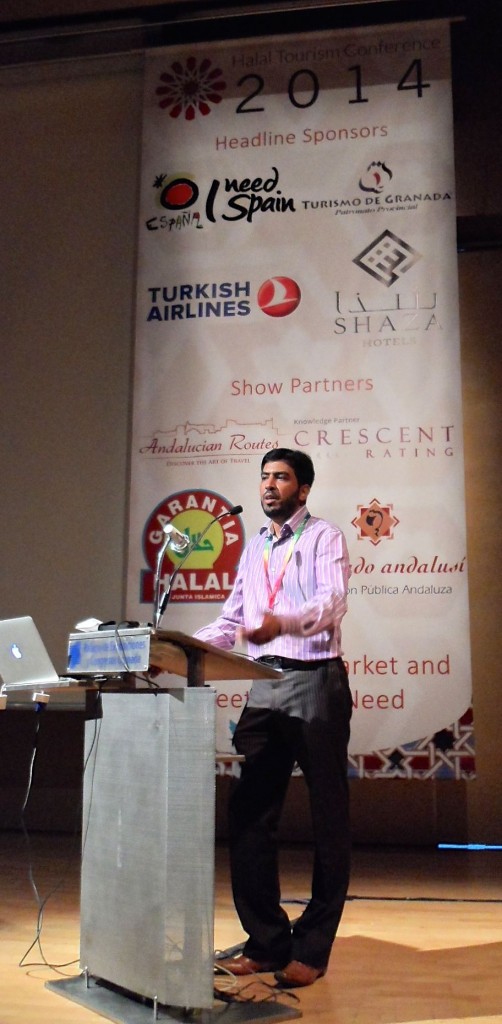 Mr Tariq Mahmood |
Mr. Tariq Mahmood, Founder and managing director of Andalucian Routes, recounted his personal story of how the Islamic heritage of Spain had helped him better come to terms with his identity as a Muslim living in Europe.
Formerly from the Pakistani side of Kashmir, he moved with his family to Birmingham when he was only six. Now 49, he first visited Granada in 1986 and was surprised by what he saw. Still trying to come to terms with his dual Islamic-European heritage, he saw the south of Spain as a bridge between two cultures. A deeper study of history unearthed even more treasures about Islam’s contribution to European science, arts, public administration and urban design. That many advances had been made by eminent scholars of the three Abrahamic religions, Christianity, Judaism and Islam, during that period, also resonated strongly.
He said, “Like many other Muslims growing up in the West, there were a lot of questions related to our identity – where do we belong, do we have anything in common? When I first arrived in Spain with my friends and crossed the Pyrenees, something started to feel a bit different – the architecture, the culture, the greenery. Then we came to Cordoba and Granada and I suddenly felt at home. This was a meeting of East and West. It had a huge impression on me. And then I thought it would be amazing one day to set up something that would help me identify a connection with Europe.”
Thirteen years ago, Mr. Mahmood set up Andalucian Routes and today brings Muslim visitors from all over the world. “You have monuments here that you can’t even find in Muslim countries.” His job is made easier by the fact that Spain has a superb travel & tourism infrastructure. Following the Quranic instructions which urge people to travel in order to learn from other civilisations, Andalucian Routes tours have a very strong element of knowledge and education. “Visitors go back with a different perspective and an experience that moves them and changes them.”
Mr. Mahmood showed a BBC documentary on ‘Project Convivencia” (co-existence), covering a period of more than three centuries during which Muslims, Jews and Christians had co-existed and prospered. However, the documentary said this incredible story had been “systematically written out of history” in spite of its important linkages to European culture and heritage.
He said when he first began broaching the idea of the Halal Tourism Conference to the Granada tourism authorities, there was some initial resistance. However, he said, times are bad and they began to see the potential. Most visitors to Spain go to the seaside and come to Granada for a day tour which has limited benefits to the local hotels or the restaurants. “But if they better tap the Muslim market, they can get thousands of people. For Muslims, it is a great opportunity to see how an Islamic civilisation flourished in Europe. For Europeans, it is a great opportunity to see how Islam has contributed to their culture and heritage.”
After Mr. Mahmood’s talk, Mr. Mohammed Yahia of Etihad Airways said he had heard a lot about the Alhambra, but actually seeing it was an uplifting experience, especially because he could understand the Arabic inscriptions. He called it “a big opportunity for halal tourism to Spain” saying it had “left me wondering what the other cities of Spain had to offer.”
One Spanish lady delegate in the audience said, “Islam is in our DNA. We welcome the Muslim people from all over the world. Our philosophy and your religion and habits have much in common.”
Malaysia: Strategies of world’s top-ranked Muslim-friendly destination
Mr. Zulkifly Mohammed Said, Director General of the Islamic Tourism Centre in Kuala Lumpur, said Malaysia hosted an estimated 5.2 million arrivals from the Islamic world in 2013. He said Malaysia has been voted as the top destination for Muslim tourists in 2011, 2012, 2013 and 2014 by CrescentRating. KL International Airport was also voted as the most Muslim-friendly airport in the world.
Muslim visitors can now find prayer facilities at all Malaysian tourist spots and public premises; access to halal food, including fast food outlets, and well-prepared hotel services. Islamic festivals are marked year-round and halal certification schemes are well-established and recognised. Numerous Islamic events are organised; one Quran-reciting competition features a regular participant from Spain. At medical tourism centres, female patients can be treated by female doctors; Arabic-speaking staff and prayer facilities are available. Even the mosques are moving to attract visitors and show
Mr. Zulkifly said many non-Muslims who visit Malaysia get a completely different impression about Islam than the violence they are exposed to in the conventional media. He said KL hosts the world’s biggest international Halal exhibition, the 11th Malaysia International Halal Showcase (MIHAS) and World Halal Conference, to be held next between 1 – 4 April 2015. It is also home of World Islamic Economic Forum (WIEF), a global event founded by Tun Musa Hitam, former DPM of Malaysia. The 10th WIEF will be held on 28-30 Oct 2014 in Dubai.
He said many hotels, such as the Mandarin Oriental, are owned by non-Muslims and get a lot of non-Muslim travellers, but still offer Muslim-friendly facilities. He cited the example of the PNB Darby Park hotel in Kuala Lumpur which converted to a sharia-compliant hotel. Apart from the usual facilities such as prayer rooms, etc., the hotel serves no alcohol and is totally halal certified. “Whenever I have visited the hotel, I see quite a lot of non-Muslim guests. I ask them why they choose the hotel; they replied that while the good location near the KL Twin Towers is one reason, it is also because of the no-alcohol policy.”
Mr. Zulkifly lauded the choice of Granada for the conference, and expressed hope that it had produced the desired results, both in terms of allowing Muslim delegates to see the Islamic sites of Spain, and the local tourism authorities to notice its contribution to the local economy.
He said Islamic countries can help each other by organising international MICE events in Muslim-friendly destinations. He also noted the improving standards of education in universities in Islamic countries, such as the International Islamic University of Malaysia, where one of the former professors is the present Prime Minister of Turkey. Malaysia is working on a strategy to attract more Muslim visitors from source-markets such as China, which has a sizable Muslim minority. He noted that many non-Muslim countries such as Japan, Korea, Taiwan, Australia and New Zealand, had begun to cater to it via product improvements, guidebooks and visa-relaxation.
Mr. Zulkifly said an Islamic tourism blueprint for Malaysia had been approved in 2013. The ITC is now finalising Muslim-friendly hospitality standards for accommodation, travel agents and tourist guides, expected to be launched in Dec 2014.
Indonesia: A Natural For Promoting Islamic Tourism
Mrs. Esthy Reko Astuty, Director General of Tourism Marketing, Ministry of Tourism and Creative Economy, Indonesia, noted that her country, home to the world’s largest Muslim population, was a natural for promoting Islamic tourism. The country is capitalising on the growing demand for sharia-compliant properties by positioning itself as a Muslim-friendly destination. It boasts more than 600,000 mosques, 37 sharia/halal-certified hotels, 300 restaurants, 27 tour and travel companies and 29 spas. The Ministry is seeking to expand this number by identifying new destinations, giving them marketing and promotion support, and capacity building to upgrade services. This is being done in collaboration with provincial governments, academic institutions, the Indonesian Council of Ulama, the Muslim Community and the tourism industry.
At the moment, she said, 13 destinations are classified as Muslim-friendly and ready to cater to the high demand: Aceh, West Sumatera, Riau, Lampung, Jakarta, Banten, Bandung, Yogyakarta, East Java, Central Java, Bali, Lombok and Makassar. The country has also hosted a number of events and conferences on promoting sharia-compliant tourism, including the first OIC International Forum on Islamic Tourism. More such marketing efforts are planned, including one at the May 2015 Arabian Travel Mart in Dubai.
Italy: Two Million Muslims Expected for Milan Expo 2015
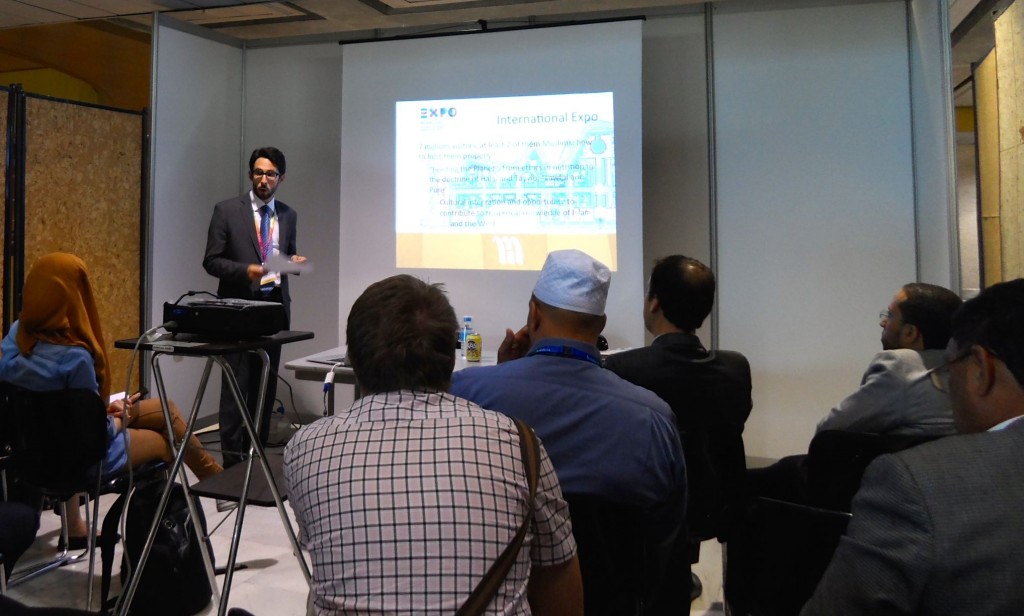 ‘Isa Nicola Benassi, Quality Assurance Manager of HalalItalia, briefing the workshop |
In his workshop briefing, Mr. ‘Isa Nicola Benassi, Quality Assurance Manager of HalalItalia, noted that “Rome” is the only European city actually mentioned in the Quran, in the chapter known as “Surat-ur-Rum.” Noting the presence of Muslims in Sicily during the Middle Ages, he said there are about 1.5 million Muslims in Italy, including both Italian converts to Islam plus immigrants from North Africa, the Middle East, Central and Southeast Asia. However, Islam is still not officially recognised by the government and the integration process has a long way to go.
He said it was important to take every opportunity to build cultural bridges between East and West. “We need tools,” he said, such as interfaith dialogues, cooperation with Italian institutions, education in schools, cultural and artistic exchange, more bilateral commerce and finance. It is very important to have good relations with the Catholic Church. “If we show the Italian people that we have good relations with the Church, the Italians will facilitate the bridge-building process between Christians and Muslims.”
He said that the Italian Islamic religious community was officially set up in 1986, which was followed by the halal certification of Italian products in 2009 and the Muslim hospitality project for restaurants and hotels in 2014. Italy is gearing up for the Expo 2015 in Milan which is expecting about seven million visitors, including at least two million Muslims, many of whom would like to avail of halal-friendly facilities. He said this would be a great opportunity for cultural integration and exchange of knowledge about Islam and the west.
Croatia: Islam Recognised as an Equal with Other Religions
Mr. Nermin Merdzanovich said that getting a proper halal certification scheme has been a top priority for both Croatia and Bosnia-Herzegovina. This has now been done. A rulebook of certifying and categorisation of hotels and restaurants has been expanded to hospitality services, travel agencies and health facilities. This has created a base for development of Halal tourism in Croatia.
He said the history of Islamic Croatia stretches over 800 years. “We are one of the four countries in Europe which has a law passed by the Parliament recognising Islam as equal with other religions. So we have a very good partner in the state and in ministries as well as in tourists boards and organisations. Croatia is considered one of the most beautiful countries in the world. And Zagreb is one of the most exciting cities.” Further info: www.halal.hr
Hotel view: The Branding Dilemma
The conference featured a talkshow-style discussion with Christian Nader, VP Development of Shaza Hotels/Kempinski, and Federico Portal of Alanda Hotels.
Mr. Portal said that Alanda hotel in Marbella was the first in the group to be declared halal compliant after a change in ownership. “The Muslim market was very important for us in addition to the other markets we are working with. It was a challenge for us because it had not been done before. We broke from tradition in Costa del Sol. We have just finished high season and have had great feedback from the halal Muslim market.”
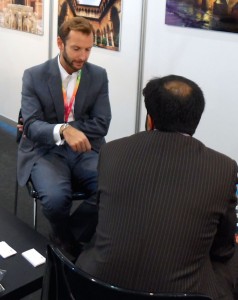 Mr Christian Nader |
Mr Nader said Shaza hotels, a branch of Kempinski, is planning a maximum of 25 hotels under the Shaza brand, primarily in the Middle East and eventually in other locations such as Brunei Darusalaam, Indonesia and Malaysia.
He said it is important to distinguish between labels such as sharia-compliant, Halal and Islamic. “At one Shaza hotel we have a totally halal breakfast. In the rooms, there is a prayer mat, Qibla indicator and we have also removed the alcohol. We have a gender separation in the spa. The cocktails have been reinvented as mocktails in a creative way that respects our history and culture. We also cater to the wedding market.
“The keywords are respect and flexibility. You don’t want to alienate guests. It’s just a lifestyle choice at various levels. One is the family level (finding an environment that is safe for children); another are the government and business clientele many of which prefer to book conferences and meetings in ‘dry hotels’, both because it enhances delegate productivity and keeps costs down. A third level is the healthy sports lifestyle. (Before joining Shaza) I opened a dry hotel, the Bristol, in Sarajevo. The top group reservations came from the football teams that came to play there.”
He said the first Shaza hotel had opened in Madinah Munawarra where, naturally, everything had to be sharia-compliant. Across the other hotels, however, “we take a cultural approach to the brand, not a religious. We don’t serve alcohol but we don’t market them as sharia-compliant or an Islamic property but one that respects the culture of the Muslim world.”
Mr. Nader said the group is working on its first hotel at a resort in Oman. “Because guests always expect high standards, we try to identify those markets and cater to their requirements. We provide an open beach for everyone but also have private villas with private swimming pools. There are places in the Malaysia and Southern Turkey which are doing that well. Some hotels also have women-only floors.”
The panelists were asked if global hotel brands can cater to the market. Mr. Nader noted that the Taj hotel in Dubai has not offered alcohol for the last two decades. The Hilton has signed two hotels in Qatar, neither of which will have alcohol. That may create some branding and market confusion, especially if an American guest checks in and expect to have alcohol and a night-club. Even in London, the first alcohol-free hotel has just opened, also owned by a Qatari businessman.
Mr. Portal said it won’t make any difference. He said when the Alanda hotel in Marbella first opened in 2003, it mainly had local clients. When it moved to an alcohol-free status, it was feared the local clients would go away. That didn’t happen. “They came back and had great compliments.”
Halalbooking.com: Ready to Provide Advice and Assistance
Elnur Seyidli, of HalalBooking.com, outlined the potential and the opportunities that are emerging for what his website refers to as “holidays in accordance with Islamic beliefs.” He urged delegates to be careful about the terminology because it may not translate well into other languages. He said his company would be ready to help share market insights with suppliers and tourism offices; advise hoteliers on design and layout of halal services; support DMC’s with design of tour itineraries; facilitate fam trips to destinations and market a supplier’s brand to global customer base.
Post-conference tour: Gracious hosts everywhere
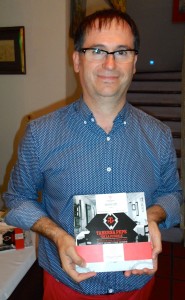 Toni Gomez Lopez, Proprietor of Taberna Pepe “de la Juderia” |
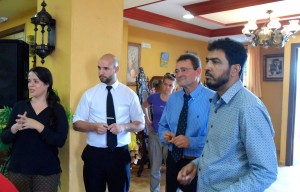 The owner and operator of the Los Al Mendros restaurant (second right) welcoming his Muslim patrons. |
 Mr. Gael Vignon of El Cortes Ingles |
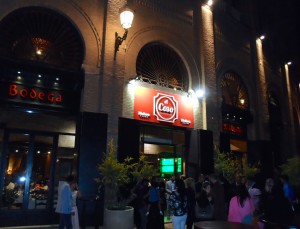 El Coso restaurant, Cordoba |
The two-day post-conference tour was also an eye-opener. It took in the former mosque-turned-cathedral in Cordoba, the old Muslim quarter Albayzín in Granada, which now boasts the city’s first Mosque in centuries, and the archaeological site of Madinat Al Zahrah, the city built by the Caliph Abdul Rahman III, along with the outstanding museum of its history.
Meals were hosted a number of restaurants which are working with Andalucian Routes to attract Muslim visitors, e.g., the Cabezas Romero, the Los Al Mendros, and the Taberna Pepe. In Malaga, dinner was hosted one evening by the El Cortes Ingles department store. Its Director of Tourism & Marketing, Mr. Gael Vignon, said the department store group, one of the largest in Europe, was now getting a growing number of high-spending visitors from the Middle East and Asia, and keen to make sure that it had the facilities in place to meet their needs.
Conclusion
Barring the few organisational glitches that come with any first-time effort, the Halal Tourism Conference received an overwhelmingly positive response.
One of the event sponsors was Turkish Airlines which is capitalising big-time on the mega-million Muslim population to enhance the role of Istanbul airport as a true aviation crossroads between East and West. Mohammed Yahia of Etihad said he is now looking seriously at the possibility of creating a separate category of halal products under the airline’s tour programmes. Morad Issaouti, a Dutch national of Moroccan origin, said he was about to launch an app that would allow Muslim visitors to know the locations of all mosques in Amsterdam.
Ms Belen Salgueiro Vazquez, a Barcelona-based tour operator, said she had come to learn about the culture and values of the Islamic market in order to bring more visitors to her city. A Slovenian hotelier said they are working with the small Muslim community there to create halal certification to cater to the growing number of Gulf Arabs coming to Slovenia for the water-springs and health spas. Two I.T. consultants from South Africa, which has a sizeable Muslim minority, said they would be able to make significant use of the knowledge base to make South Africa more halal-friendly for Muslim visitors.
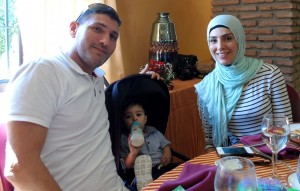 Lebanese-Australian couple Walid and Marwah Harris, from Sydney, who signed up for an Andalucian Routes tour of Islamic Spain to reconnect with their heritage. |
Overall, Creative Minds Media Co Founder and Director Tasneem Mahmood said the conference had provided an “excellent start for this discussion” on the promotion of halal tourism in Europe. She thanked all the sponsors and participants and speakers for their support and said the country host of the 2015 event would be announced soon.



Liked this article? Share it!